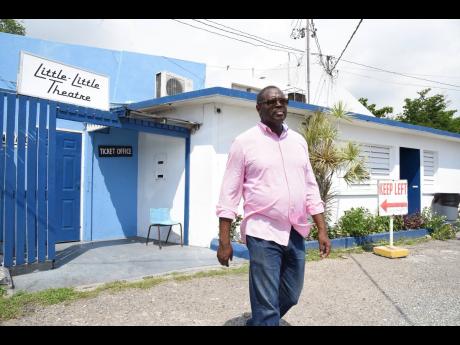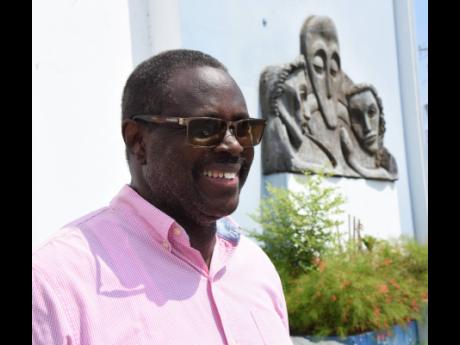Basil Dawkins talks lessons learnt from his life in theatre
Irony is at the heart of all good drama. So it was appropriate that the man who has become Jamaica’s most prolific dramatist was pushed, perhaps not kicking and screaming but certainly protesting, into theatre.
Basil Dawkins has so far written more than 40 plays, and he is currently putting the final touches on yet another, which is slated to open on December 27 at the Little Little Theatre. That is when and where his plays have opened annually over the last couple of decades.
The plays have been produced by Basil Dawkins Productions, for Dawkins is not only a playwright, but a producer as well. As such, and because he focuses on his own plays, the numbers of his productions and his scripts are roughly equal. They are not identical because he has produced some of his plays more than once and because some of his plays have not yet been produced.
One of the latter is his first musical, which was written during the lockdown of theatres caused by the COVID-19 pandemic. It is now with a musician being set to music, and of it he wistfully states: “I would love to see it, but I have no idea when it will be produced.”
It has a cast of 20, he explained in a recent interview with The Sunday Gleaner, and it would cost far more than the $3 million to $3.5 million he currently spends to stage his usual small-cast plays. His last play, Hide Your Husband, has only three actors. A couple of his plays are two-handers, and he says he’s considering writing a one-man play.
In addition to writing and producing, Dawkins has a passion for teaching, which is why his plays aim to educate as well as entertain. It is also why he is enjoying his new job of teaching playwriting at the Edna Manley School of Drama.
Not surprisingly, then, during our conversation he, time and again, referenced the lessons he has learnt from his career in theatre. Though he ruefully admitted that his second play – “a flop,” he called it – taught him even more about writing than the first did. We spoke more about the latter.
His first play, Flat Mate, opened Friday, February 22, 1980. Dawkins’ mother was the first of many to push him towards the winding, often rocky, road that led to the theatre, The Barn, where the play premiered. It was because of Dawkins’ boyhood shyness that his mother suggested that he get into acting. Facing audiences would help him overcome the condition, his mother told him, but little Basil wasn’t interested.
It wasn’t until he went to The University of the West Indies (UWI) years later, and during Freshman’s Week, saw theatre productions that his interest was piqued. He accepted the offer by the director of the Taylor Hall drama group to take part in a play.
He had one line and studied it “like a Shakespeare sonnet”, he told me, only to miss his cue and thus cause someone else to say the line. He was most upset but subsequently went on to perform in 15 university productions before graduating.
When a classmate got involved in a commercial production of Carmen Tipling’s The Skeleton Inside, the author allowed Dawkins to sit in on rehearsals and attend productions free. This gave him “a feel for how the commercial theatre operated”, he said.
His interest in theatre grew as a result of the many conversations he had with another friend, playwright Trevor Rhone, his neighbour, but the corporate job he took after graduating from university, and the travelling that it entailed, prevented him from continuing with acting.
“So the next best thing I could do, if I wanted to stay with theatre, was to write as I could write in my own time,” he said.
Intrigued by how the young women at his workplace could dress so well, while earning less than he did, he came up with the idea for Flat Mate. He wrote it and entered it in the Jamaica Festival Literary Competition (now the Jamaica Cultural Development Commission competition) and won a bronze medal. Satisfied that he could write a play of some merit, he put it out of his mind until the man responsible for the competition, Bari Jonson, telephoned him to encourage him to produce the play.
Putting aside doubts about getting into production, Dawkins tried to get sponsors, but he became discouraged after a year of refusals. He was about to give up when a businessman friend, Orville Blackwood, pushed him into trying to fund the production himself. After listening to the many challenges involved, Blackwood took Dawkins to his bank manager and arranged a loan of $3,000 for Dawkins. With another $3,000 from his credit union and a similar amount from his father-in-law, Dawkins went about obtaining a director, Keith Noel, and some of the best actors available.
The final problem was finding a theatre for the staging. “It was difficult to find theatres then as it is now,” Dawkins said.
However, thanks to the efforts of another friend, the late Trevor Nairne, who put him on to Yvonne Brewster, the owner of The Barn, then in England, Dawkins got his space for the production.
Rehearsals proceeded well, but as happens in good plays, there was a twist in the tale. On the day the play was to open, some malicious person — Dawkins never found out who — got JBC radio to run a public service announcement that the opening was postponed
In a panic, Dawkins, then working at an insurance company, told his boss what had happened. She, in turn, spoke to her boss. The result was that the company bought tickets for enough employees for Dawkins to have a full house.
When on the following Monday morning Dawkins offered to pay back the bank loan, the manager would have none of it. “I took a chance with you,” he said. “Now the bank has to make some interest on the loan.”
On the advice of the manager - “Good advice, when I looked back on it,” Dawkins said - a “line of credit” was established. It, along with the excellent houses the play continued to attract, enabled Dawkins to extend the weekend run of the play into the week, and later, face no financial problems for the staging of his next production.


